And sub-alpine white and red fir forests are fascinating ecosystems.
High above, a thick canopy of "leaves" only moose can eat (and there are none in CA). And if you can get up there, the flaky cones have tiny seeds that make pine nuts look hearty. Finally, on the ground below, in heavy shade - a debris field of fallen deadwood, with few understory plants.
And those understory plants - they're often parasitic - living life with few/no leaves, instead getting their energy through taps into the fungal and tree root networks beneath the detritus. A good adaptation for low light, heavy snow, and a short growing season, to be sure. But poor forage.
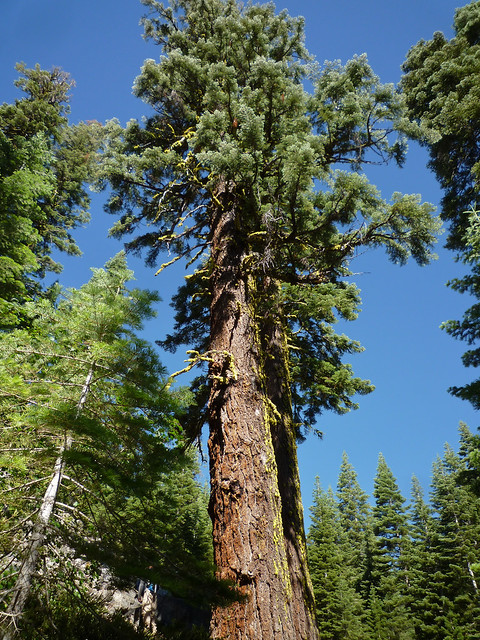
Red and white fir often dominate California's upper montane forests
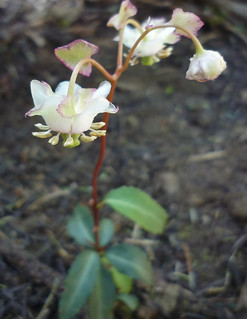

Pipsissewa and Wintergreen
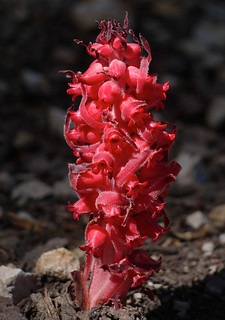
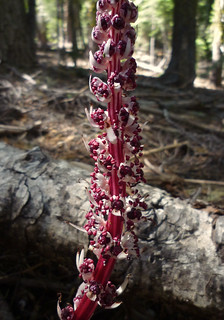
Snow Plant and Sugar Stick
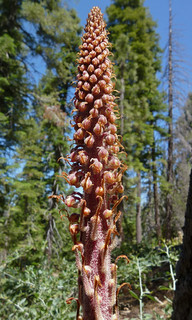
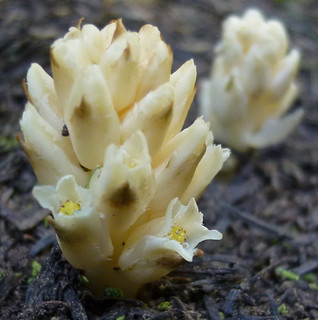
Pine Drops and Pinesap
For pure herbaceous browsers, such as deer and rabbits, fir forests are boring places. They're restaurants with almost nothing on the menu - except them.
Instead, the food web in fir is centered around wood eaters, ala fungi, termites, ants and beetles, and seed/shroom/insect eaters, such as birds, squirrels and mice. And the eaters of those, of course, and so on, and so on.
For my set this late summer I pointed the cam at a rocky jumble, knowing from Codger-wisdom that they're the spots that draw critters - in the semi-uniform understory of fallen fir bits.

Cam trap set on rocks in dense hillside fir forest
First, let's get squirrely. A variety of Sciuridae live in fir forests, and 3 visited the rocky outcrop:

Young chipmunk - perhaps Neotamias senex, or quadrimaculatus

A fast moving Western Gray - not a common species in fir forests, preferring pine and oak

Young Douglas squirrel, aka Chickaree, Tamiasciurus douglasii
At night, a strange play occurred - Of Mice and Millipedes. Deer mice and Yosemite millipedes both roamed the rocks, with occasional encounters that didn't seem to make the mice happy. Lacking the abilities to bite or sting, many millipedes squirt cyanide-based compounds as a defense - perhaps that's the lesson the mice learned.

Deer mouse, Peromyscus maniculatus, & Yosemite millipedes, Californiulus yosemitensis
 Juvenile deer mouse and millipede
Juvenile deer mouse and millipede
Same juve deer mouse with ick-face after apparent millipede encounter
Along with the scurriers, a few birds poked their beaks around the rocks:

A not-so-early robin caught a caterpillar

A northern flicker hunted the rocks several times for ants or termites or like

And a Steller's jay paused to crest
Last, but in no way least, a golden bear passed through and schmutzed the camera:



Unfortunately, no pine martens or flying squirrels this year.
Maybe in 2013.
====
References:
- SF State University Field Campus - Photographing Wildlife with Camera Traps
- The Camera Trap Codger - 2012 Workshop
- BugGuide - Yosemite millipede
- Calflora.org - Abies concolor, Abies magnifica
- Nature of a Man (this blog) - Just Another Manic Marten
- Nature of a Man (this blog) - Drinking from the Firehose

Pinesap! I haven't seen that before, pretty cool looking. Mice and millipedes are a bizarre coupling. Some nice bear shots too...your codgeresque intuition looks like it paid off.
ReplyDeleteYes - the Pinesap was a righteous find (and not by me), and has only been seen the one time.
DeleteLOVE that ick face, poor little guy. =) I'm w/Steve re: pinesap. Cool.
ReplyDeletebtw, I think it's actually cyanide compounds that they secrete, not arsenic. http://bugguide.net/node/view/37
Whenever we have to scoop them out of buckets, we change gloves afterwards in case we encounter a non-millipede animal, like a frog or salamander. Don't want to share that particular bounty. Or wipe one's eyes with it...
=)
Thanks for the quick catch bb - I read and knew it was cyanide, but typed arsenic.
DeleteThat Stellar's Jay picture is amazing....love the homebrew cameras! Wish I had the time, money, and intuition to figure out how to do it. I also love the chickaree, very sweet little face :)
ReplyDelete